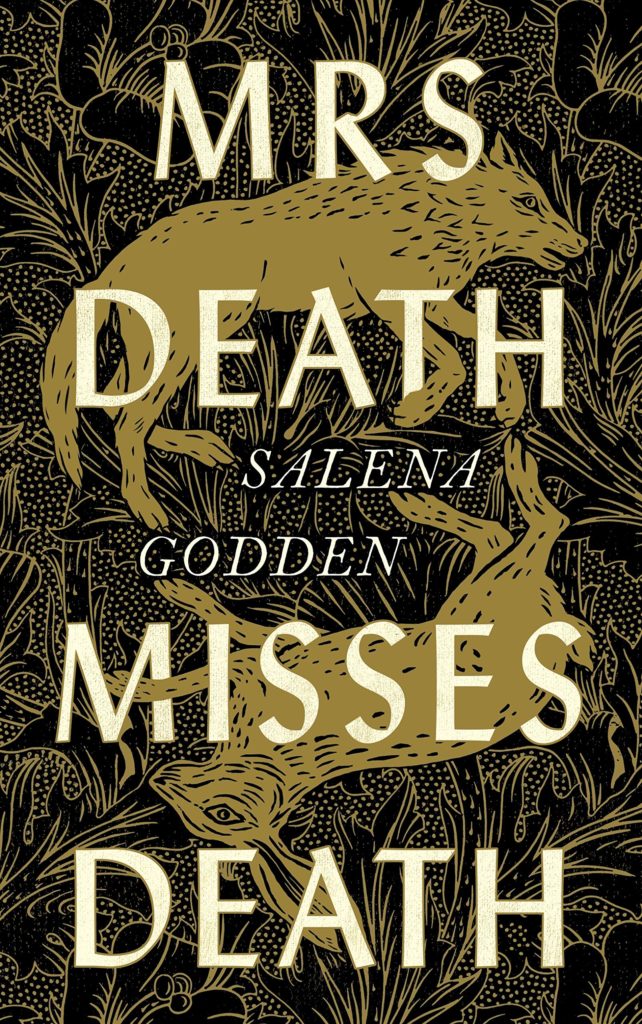Salena Godden’s debut novel is as much an affirmation of life as a tale of death, writes Wendy Erskine.

There’s the elegant Gentleman Caller Death, courteously inviting Emily Dickinson to take a seat in his carriage. And Death as a skeleton, doing its bony boogie, its danse macabre round the medieval churches and cathedrals of Europe. But oh look, there he is, asking you to play a game of chess with him down by the sea. And we all know all about the Grim Reaper although come on baby, don’t need fear the Reaper. It’s not often that death has been conceptualised as a woman. Even more rarely has she been a working-class Black woman. Yet in poet and performer Salena Godden’s first novel, Mrs Death Misses Death, that’s exactly who death is. Why? Because only ‘she that is invisible can do the work of Death. And there is no person more silenced than the woman, the poor woman, the poor old woman, the poor old black woman, your servant bent over a mop, cleaning the floor of a hospital.’
Wolf Willeford, a troubled, possibly suicidal young writer, buys an old desk in a junk shop. This new purchase acts as a portal for communication with Mrs Death and a conduit for travel across time and continent with the woman herself, Wolf taking on the duties of committing to paper her memoirs. As befits a global figure active for millennia, the deaths that are recalled range across time and also space: London, Spain, Edinburgh, Australia, Northern Ireland. But although acting as Mrs Death’s faithful amanuensis, Wolf also tells the story of the Willeford family, extending right back to the Willeford grandparents. In this composite novel, there are accounts of their lives, Wolf’s diaries, and beyond that, plenty else: lists of ways of dying, recorded conversations between Mrs Death and Wolf; a monologue delivered by a desk, the world-weary Mrs Death’s dialogue with a doctor; letters; poetry in various forms. It’s a dextrous, exhilarating and wild accumulation of perspectives, full of irreverent juxtaposition and surprising tonal shifts.
You know, this book feels both very new and very old. Except perhaps for Gordon Burn’s Born Yesterday, which used the news stories of 2007 to create a fiction, I don’t think I’ve ever read a novel so consciously now. 2021 is on every page: racism, climate change, patriarchy, fake news, the arms industry, mass shootings, the drowning of refugees, food banks, Nightingale hospitals. It engages in an unapologetically relentless way with the present. Mrs Death considers the ‘special people’ worn on T shirts — Che Guevara, Malcolm X and Bob Marley — but identifies the real heroes among those living right now: ‘Your heroes are working overtime in the crumbling NHS A&E departments, your heroes are your doctors and nurses, your teachers and volunteers, people taking phone calls at the Samaritans and talking people down from the edge…Your heroes are everywhere, they walk among us.’
But it is also a book in an old tradition of personified abstractions, of didactic allegory. Mrs Death, for example, has a sister: ‘My Sister. Life. She is constantly vomiting, and puking cherry pips and cherry blossom everywhere. Every time life lays an egg, Death eats an egg.’ Mrs Death and her sister both have Time as a lover, a ‘demagogue dictator’ who ‘loves a deadline.’ But sister Life lives in denial and refuses to believe that Time and Death must also have ‘some sort of love for each other.’ The meditations on life and death are complex, varied, always provoking. Without death, Mrs Death asks, what would we be? Nothing but ‘big-breasted, hot-fisted infants, as destructive as children stamping on sandcastles; you would be worse than you already are.’ What would it be like, Wolf asks, if our expiry date was stamped on our heads? If ‘we knew exactly how long and how little left we had to love each other, maybe then we would all be more kind and loving.’ Or would we be? Wolf isn’t sure and neither am I.
This is as much Wolf’s tale as it is Mrs Death’s, and that fact means it is also life’s. Sure, everything is precarious: it can be taken away so easily, so carelessly. Life is also hard and cruel. But remember, this book was written by the author of the brilliant poetry pamphlet Pessimism is for Lightweights. Godden affirms that life, besides these other things, is also thrilling. And precious. It’s not a rage against the dying of the light, that last-ditch fury as darkness closes in, but rather an invitation to extract the most from what little we have. Rarely have I read a book that has made me feel so grateful to be alive. ‘So take today and blow its mind,’ Mrs Death says, ‘take this today and suck it dry. Take today and down it in one, take today like a shot of petrol and set your day alight…Take today and fuck it like the last fuck in Pompeii as burning lava covers your home.’ Off you go!
*
At the end of this book, there is a little section where the reader can fill in the name of a loved one, so that the copy of Mrs Death Misses Death contains the reader’s own dead. If this particular text exists longer than we mortals, so too will the names of our loved ones. I can be a tough old bird. I can see how I might have found this mawkish and sentimental. But such is the curious power of this book that I wrote the name of my dad who met Mrs Death unexpectedly one night in November 2016. Miss you. You were great.
*
‘Mrs Death Misses Death’ is out now, published by Canongate. Buy a copy here (£14.99).